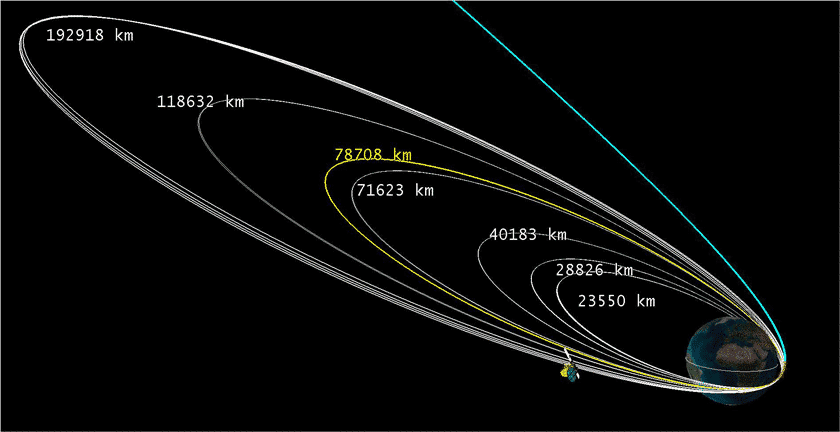Emily Lakdawalla • Nov 30, 2013
Congratulations due to India: Mars Orbiter Mission is on the way to Mars!
Today I am delighted to welcome India into the ranks of interplanetary travelers. Today their Mars Orbiter Mission has successfully propelled itself onto an interplanetary trajectory, departing Earth forever and setting sail for Mars. No matter what happens to the spacecraft between now and next September, India has achieved interplanetary travel. Congratulations to India, to the Indian Space Research Organisation, to the mission's scientists and engineers, and to the people of India.
As reported on ISRO's website, the rocket burned for 1328.89 seconds to impart an incremental velocity of 647.96 m/sec. Here's a little animation I put together from photos posted to the mission's Facebook page:
What's next for the mission? According to a Press Trust of India article, the plan includes four trajectory correction maneuvers, the first happening on December 11. The rest are in April 2014, August 2014, and then 10 days before orbit insertion on September 14.
There are a lot of things that are challenging about space exploration. But some things are more hazardous than others. For this mission, the three most hazardous events were always the launch; the injection onto an interplanetary trajectory; and arrival at Mars. All three of these events have to go absolutely perfectly -- any problem would almost certainly mean failure of the mission. Mars Orbiter Mission has now successfully weathered two of the three biggest challenges. The last comes in September 2014, when the spacecraft will meet Mars.
When Mars Orbiter Mission arrives at Mars, the planet and the spacecraft will be on different heliocentric orbits. Mars Orbiter Mission must fire its rocket in the right direction, for long enough, to change its heliocentric orbit enough that Mars' gravity will take control of the spacecraft's path. There is only one chance to get that right. We can look at Japan for two tragic cases when this step did not go well. Japan's Nozomi, which was intended to be a Mars orbiter, suffered a series of setbacks, beginning with a short trans-Mars injection burn, and ending with frozen fuel lines. Nozomi reached Mars but was unable to fire its rocket to enter orbit. Unable to be grabbed by Mars, it continued on a heliocentric orbit and, too damaged to produce a useful science mission, it was shut down. Akatsuki, which was intended to enter orbit at Venus, suffered a catastrophic failure of its rocket motor partway through the burn. Akatsuki shifted its orbit somewhat, but not enough to be able to enter orbit at Venus. There is still a small amount of hope that Akatsuki may be able to achieve Venus orbit once it comes back around the Sun, in 2015 or 2016, but even if it does, it will not be the same mission as intended because it will not be the right orbit.
Of course there are other kinds of failures, too, like the one that happened to NASA's Mars Observer only two days before it was to arrive at Mars. India is not out of the woods yet; the next step, entering Mars orbit, is a tough one, and it comes after 300 days of deep-space operations. But so far, so good. And so far, it is more than India -- or, indeed, most nations -- has ever achieved before.
Let’s Go Beyond The Horizon
Every success in space exploration is the result of the community of space enthusiasts, like you, who believe it is important. You can help usher in the next great era of space exploration with your gift today.
Donate Today

 Explore Worlds
Explore Worlds Find Life
Find Life Defend Earth
Defend Earth


